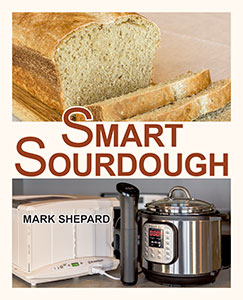Probably the most controversial advice in my book Smart Sourdough is to add baker’s yeast to your sourdough for the rise. Actually, this practice is common in artisan bakeries, where there’s even a name for it: “spiking the dough.” But to many home sourdough bakers, the idea is heresy, pure and simple. So, it’s worth saying a few more words about it.
Truthfully, before I started research and testing for my book, I would never have considered adding commercial yeast to my sourdough. To me, that was the worst kind of sourdough cheating. But the more I learned, the more I had to question my bias.
My belief that baker’s yeast is a recent invention turned out to be mostly wrong. The yeast species used in commercial baker’s yeast—Saccharomyces cerevisiae, if you want to get technical—is the same species used for thousands of years to brew beer. Food historians say at least some ancient Egyptian bakers probably leavened their bread with yeast of this kind, which they obtained from breweries. We know for a fact this is how bakeries in the United States got yeast for their bread in the 1800s.
What we call brewer’s yeast today, though, was later bred from certain strains of that species—strains that were suited more to brewing and less to baking. In response to that, food scientists developed baker’s yeast from strains of the same species but with the opposite character. So, yes, the product known as baker’s yeast is relatively new, but it’s a refinement of something used by bakers for millennia.
I also had to give up my belief that baker’s yeast was somehow inferior to natural yeast. First of all, baker’s yeast is a natural yeast, as are all yeasts. Saccharomyces cerevisiae is also found in nature. The only difference in commercial strains is that they have been isolated and bred for greater strength. This is not very different from what sourdough bakers do when they develop a starter to encourage some strains of yeast and bacteria and discourage others. And no one claims that these yeasts or bacteria are less “natural” if you add them as dried bits from someone else’s starter you bought online.
With that understood, I couldn’t deny that baker’s yeast is mostly superior to other yeast species found in sourdough. It’s stronger, making the bread rise faster and higher. That’s why this one species has been isolated and cultivated!
What makes sourdough superior to other bread is not the yeast but the sourdough bacteria. It’s these bacteria that mostly produce each advantage of sourdough—the greater digestibility, the increased availability of nutrients, the resistance to spoilage, and last but not least, the sour taste we love it for. Meanwhile, the relative weakness of most sourdough yeast species may be this bread’s most common disadvantage.
The fact is, if using cultivated yeast bothers you, then you probably shouldn’t be eating wheat either. All modern wheat is a product of continual breeding from older species of wild grass—there’s not a single wheat variety that comes directly from nature. So, baker’s yeast is at least as natural as wheat itself.
In the end, all these facts and thoughts raised for me an unavoidable question: Why not? If it would entirely get rid of my need of a starter for my sourdough while still making my dough double in volume, why shouldn’t I add a pinch or two of store-bought yeast?
I couldn’t think of a single good reason. Can you?
